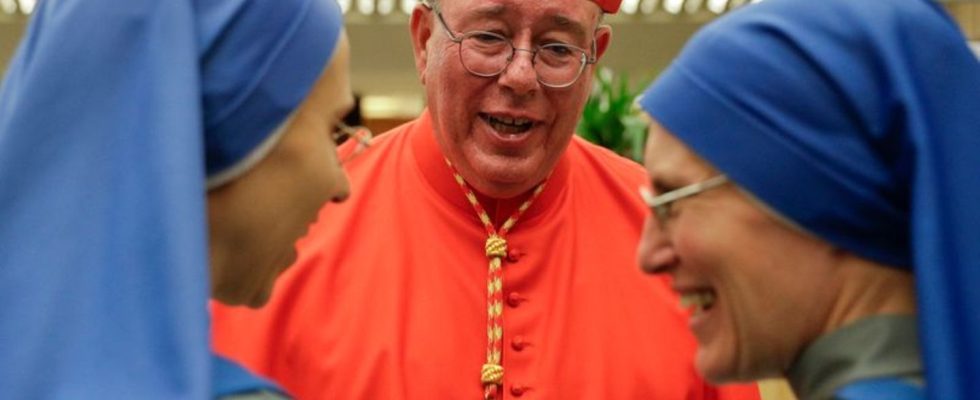A Luxembourger leads the world synod in the Vatican. Pope Francis’ confidant has a soft spot for the Asian culture of conflict resolution. He expressly does not see any other country as a role model.
What the world synod in the Vatican, which begins on Wednesday, will actually achieve is not clear to everyone involved. But one thing is certain, according to coordinator Jean-Claude Hollerich: the church meeting should not take place in the German style.
The Archbishop of Luxembourg announced in Rome in June that this German style was simply too “confrontational” and seemed “very rude” to members of other cultures, such as those from Asia. As far as the Germans are concerned, his experience is: “When they discuss things, they get angry and excited.”
Hollerich, who grew up right on the German border in Vianden, speaks perfect German and should therefore actually be familiar with his neighbors, also added an explanation for their mentality: the harsh nature of the Germans was a reaction to National Socialism, which was only made possible by her silence. As a lesson from this, the Germans have relied on unvarnished truth since the end of the war.
World Synod as a co-determination project
Hollerich, whose official title is “General Relator” of the World Synod, is considered a close confidant of the Pope and, like him, is a Jesuit. The 65-year-old cardinal is now even considered a “papàbile” himself, a possible candidate for the papacy.
Pope Francis presents the World Synod as a major co-determination project. 365 voting members will take part in the conference from October 4th to 29th. Although the vast majority of them are bishops, there are also other clergy and lay people – non-clergy. For the first time in the history of the Catholic Church, 54 women will also take part as voting members. In addition, there are experts who are not allowed to vote.
The fact that the Pope seeks dialogue with the faithful is viewed positively in the church. However, there is a fear that in the end it’s just a matter of talking to each other – but ultimately nothing should be regulated. The German Bishops’ Conference criticized the working paper that forms the basis for the discussions as being too vague.
Globally pressing questions such as the position of women in the church or the further development of Catholic sexual teaching are not given enough attention: “These issues are urgent and cannot be postponed for very long by a synodal church,” said the German bishops.
These are also the topics of the Synodal Path reform process, which the German Catholics initiated in 2019 as a consequence of the abuse scandal. In March of this year, the process was initially completed with a number of reform proposals. Blessing ceremonies for homosexual couples should be officially possible in the future.
Synodal path in Germany “not a role model”
The Vatican reacted particularly negatively to this initiative. Even the number two behind the pontiff, Cardinal Secretary of State Pietro Parolin, appeared irritated and said that the German church could not decide anything that affected the universal church. Behind the Vatican walls, the Germans’ demeanor is generally perceived as too bold.
Hollerich also repeatedly emphasizes that the Synodal Way in Germany is “not a model” for the World Synod: “The two initiatives are very, very different.” The chairman of the German Bishops’ Conference, Georg Bätzing, dismissed this as “unhelpful” in an interview with the German Press Agency: “Of course the world synod in Rome is something different than a synodal assembly in Germany,” said the Limburg bishop. “But it’s a good thing that there are different formats.”
“Synod on Synodality”
Hollerich recently emphasized in the podcast “Himmelklar” that the world synod is “not a synod about the ordination of priests, the ordination of women as deacons, (…) not a synod about homosexuality.” But what is it then? His answer: “It is a synod about synodality.” That doesn’t sound really concrete.
All Hollerich hopes for at the end of the synod at the end of October is “a short paper”, a “roadmap” for how things should proceed afterwards. Because after the synod is before the synod: Pope Francis has divided the general assembly into two, and things will continue next year in the fall.
At the German Bishops’ Conference and especially at the Central Committee of German Catholics – the representation of normal believers from the communities – there is a strong feeling that the church is running out of time. In 2022, more than half a million people in Germany left the Catholic Church – more than ever before. Surveys show that a large majority of believers support far-reaching reforms such as opening the priesthood to women, abolishing mandatory celibacy for priests and an end to discrimination against same-sex couples.
Hollerich wants compromise
Hollerich responds that much of what the German Catholics strived for or even already practiced is perceived as heresy in countries like Poland. The global church with 1.2 billion believers covers a huge spectrum of opinions. In order to keep them together, Hollerich is convinced that one must act carefully and discreetly.
According to his own words, the Luxembourger was strongly influenced by two stays in Japan lasting several years. If there is a conflict in Japan, you avoid a vote at all costs and instead reach a compromise in discussions behind the scenes, he reports in the podcast. “In Asia, synodality is also understood as harmony.”
From what we know, this is also the Pope’s position. During his ten-year term in office, Francis has repeatedly addressed problems and achieved a lot in terms of atmosphere, but he has changed much less in the structures of the church and especially in its teaching than reformers had initially hoped. At the moment everything indicates that things will go the same way with the World Synod: there will be a lot of talking and discussions, but ultimately they agree to meet again next year.

